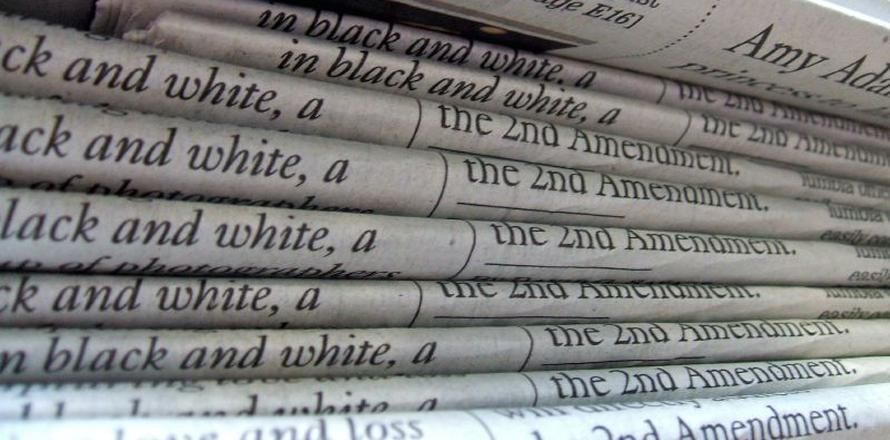
The cover story of this week’s Nation magazine by Dale Maharidge is about major newsroom layoffs at papers across the country. The article compelled thousands of people to write in with their own thoughts on the future of journalism in America. Read some of these viewpoints below.
Maharidge, a Columbia University journalism professor who worked as a newspaper reporter for 15 years, writes about the “decimation” of his former profession in his recent post: What Happens to Journalists When No One Wants to Print Their Words Anymore?
In 2007, there were 55,000 full-time journalists at nearly 1,400 daily papers in America, Maharidge writes. By 2015, that number had dropped to 32,900, thanks to the rise of the Internet and declining ad revenue. As in other professions, it’s the older, more experienced people who are often the first to be let go.
— Nathan Wesley, Facebook Comment
“[W]hat remains of print journalism is shifting, morphing into a loose web of digital outfits populated by a corps of underpaid young freelancers and keyboard hustlers, Twitter fiends and social-media soothsayers,” says Maharidge. “Gone are the packed newsrooms.”
We received hundreds of comments – some lightly edited below – on BillMoyers.com and Facebook, where over 8,000 people shared his article.
A big take home, and a sign of how things have changed over the last few decades, is the lack of respect for the profession today. This comment by Dsmith2 gets right down to it: “Never have a group of workers done more to hasten the decline of their own industry, nor been more deserving of the consequences of its collapse. As a generalization, the public hates journalists and the media.”
Elyse Marinos provides some reasons why: “It is horrifying what passes for journalism now. Made up facts, misspelled words, horrible grammar. They borrow from each other without ever verifying the facts.” Mark Haden adds: “We have allowed blogs and social media ‘punditry’ to pass for journalism. We gobble up unsourced ‘print bites’ and get mad or excited. So much for depth, integrity and research. Now it’s junk food.”
The lack of trust in journalism today led to reminiscences of esteemed reporters from our recent past, such as Walter Cronkite and Edward R. Murrow. Dawn Singh summed up the profession’s loss of credibility with this: “I came up during Watergate when Woodward and Bernstein and other investigative journalists were our heroes and journalism schools enrollments exploded. Oh my god, how far we have fallen.”
Bad for Democracy
On The Nation’s site, commenter Peter White points out that in today’s media landscape citizens can easily pick and chose what to read, to the detriment of democracy. He writes: “We now live in a boutique menu news world where people follow the kind of news they expect from outlets they agree with, not a world where they expect to read something different than their tastes have predetermined… This is a technological revolution in news-gathering and distribution that has a low bar for entry…The watchdog role of the press will disappear in the future unless good reporters can somehow manage to monetize their product.”
Many others commented that the decline of journalism is not only a huge loss for society as a whole – but that it goes against the very principles that America was founded on. “It is not just bad for democracy, it is fatal,” says Nathan Wesley, whose comment was the most popular on Facebook. “The lack of an informed citizenry allows for the sale of our country to the oligarchs with their unlimited financial influence.” Others reacted with words such as “sad,” “scary,” “tragic” and “terrible” to describe the state of media today.
— April Delalo, Facebook Comment
“Dangerous for democracy” is what Jerry Oswalt said when describing the problem of media consolidation. Oswalt is referring to the fact that just six companies control about 90 percent of media consumed by Americans, compared to 50 percent in 1983, according to The New York Times. Hope Cox adds: “Many of our journalists are handicapped by the corporate structures that own the media – or otherwise support it through their ads. Just look how long it took them to recognize US Senator Bernie Sanders’s bid for office. Contrast that with the total media time given over to the entertaining and antics of Trump!”
Marc Andries Smit is concerned that the trend toward freelancing means “journalists have no protection from litigation or government strong arming, since they are working as solitary independents with no backing from large newspapers.”
Recent college graduate Cameron Livermore, who says he’s a journalist at a small paper, is “starving out,” because the profession pays so little these days. “America loves to hate the media, but it demands instant, salacious content at all hours and will neither pay attention to nor pay for in-depth journalism.”
Liberal Bias?
A number of people blamed the decline of newspapers on a perceived liberal bias that has turned off readers. Terenc Blakely says many journalists have a “palpable hostility” for conservatives, adding: “Alienating a large part of your customer base isn’t exactly a winning business decision.”
Rush_Fan agrees and says that the growth of talk radio, FOX and the Internet – along with the 24-hour news cycle, meant journalists had little choice but to “come out of the closet and reveal themselves to be biased and agenda-driven liberals/Democrats.” Rush_Fan gives the Los Angeles Times’s policy not to publish “reader comments that deny the existence of ‘climate change'” as an example of this bias. [Editor’s note: See the LA Times policy and explanation for not printing climate change-denying statements.]
Invasive Evasion argues that Blakely is “stating it backwards,” and that it’s the conservatives who “have a pathological hatred for journalism.” In the media, both left and right are “strongly taking moral positions,” he says, but “the primary difference is that the left combines its moral positions with generally valid arguments, while the right is using blatantly false arguments to back its positions.” [Editor’s Note: According to PunditFact, which is actively checking pundits statements, about 60 percent of the claims they’ve checked from NBC and MSNBC pundits and on-air personalities have been rated Mostly False, False or Pants on Fire. At Fox and Fox News Channel, it’s 58 percent and at CNN, it’s 26 percent. While the comparisons are interesting, PunditFact warns to be cautious about using them to draw broad conclusions.]
April Delalo wonders what a future might look like with fewer reporters and if “things like viral articles and ratings” become the yardsticks that measure a journalist’s worth. “We might end up with some crazy reality TV show idiot as our President.”
And Eleanor Webber believes that “taking back the media” should be a priority for citizens today. “We need an unbiased media. How did we let people like Rupert Murdoch and Jeff Bezos, etc. take over so many great papers? What can we do about this?”
We will be putting that question to expert media watchers in coming weeks. In the meantime, we’d love to hear your ideas and thoughts about improving the media. Visit the original article and add your comments to the mix »




